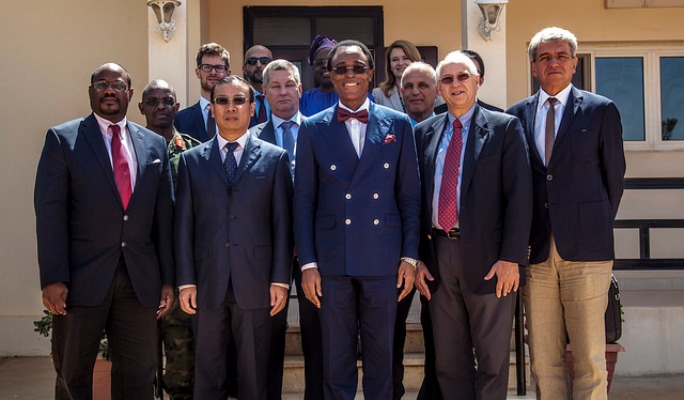U.S. envoy, UN ambassadors visit North Darfur

October 23, 2016 (KHARTOUM) – Governor of North Darfur State Abel-Wahid Youssef Sunday has discussed with the U.S. envoy for Sudan and South Sudan, Donald Booth, and ambassadors of the five permanent members of the UN Security Council illegal migration and IDPs conditions.
During the meeting in El-Fasher, Youssef disclosed that the conflict in Libya has led to flow of weapons and infiltration of some extremist groups into his state adding this could cause unrest in Sudan.
He demanded international community’s support for his government’s efforts to stem illegal migration and arms and drugs trade.
According to the official news agency (SUNA), Youssef said his government is fighting against human trafficking on the borders between Sudan, Chad and Libya, saying this phenomenon has become a real international challenge.
He stressed that the humanitarian, social and security situation in North Darfur is stable, pointing that the state is free of rebel movements.
Youssef added that his government is developing an integral plan to address the effects of war, pointing to the need to provide the basic services to the IDPs and returnees.
He also pointed to the implementation of development, services and infrastructure projects besides efforts to mend the social fabric as well as disarmament of tribal militias.
For his part, the U.S. envoy pointed that his visit to El-Fahser came upon an invitation from the head of the African Union United Nations Mission in Darfur (UNAMID) Martin Uhomoibhi, to assess the situation on the ground.
Also, the British Ambassador to Khartoum Michael Aron told reporters following the meeting that they discussed the provision of basic services to IDPs and the illegal migration.
He pointed that illegal migration doesn’t pose a problem to Sudan alone but also the European countries which deals with the issue as a priority, saying “we want to cooperate with the Sudanese government to address this problem”.
Last August, senior Sudanese security officials said that Khartoum is carrying the burden of fighting illegal migration on behalf of Europe and pointed to significant difficulties that obstruct efforts to combat human trafficking.
It is noteworthy that Sudan has forged a strategic partnership with several European countries and the European Union (EU) to combat illegal migration and human trafficking.
Sudan has been under EU sanctions since the 1989 coup d’état and didn’t receive any development aid from Europe.
However, the European body reconsidered its position following the weaves of illegal migrants from Syria, Iraq, and Horn of Africa countries. Sudan is identified as a source of migrants to Europe and a transit country for migrants from Eritrea, Ethiopia and Somalia.
Last April the EU officially allocated Sudan €100 million to improve the living conditions for refugees, help Sudanese returnees to reintegrate back into society, and to improve security at the border.
(ST)
